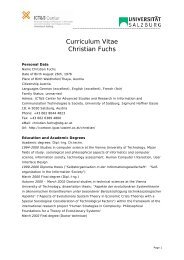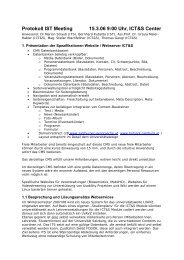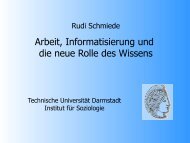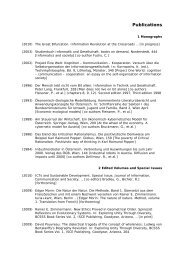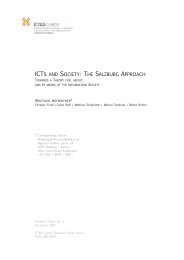Christian Fuchs: Social Networking Sites and the Surveillance SocietyN 613Mother White Collar Worker:Correlation Coefficient0.003Sig. (2-tailed)0.932N613Mother Civil Servant:Correlation CoefficientSig. (2-tailed)NMother Self-Employed:Correlation CoefficientSig. (2-tailed)NMother Retiree:Correlation CoefficientSig. (2-tailed)NMother Unemployed:Correlation CoefficientSig. (2-tailed)NMother Housewife:Correlation CoefficientSig. (2-tailed)NUsage Intensity ISNS:Correlation CoefficientSig. (2-tailed)NRead Terms of Use:Correlation CoefficientSig. (2-tailed)N** Correlation is significant at the 0.01 level (2-tailed)0.0640.1146130.0330.416613-0.0480.239613-0.0180.654613-0.0800.048613-0.172**0.0006130.0830.041613Table 12. Bivariate correlations of surveillance critique index and other factorsOur study shows that the knowledge about surveillance of students in <strong>Salzburg</strong> is ratherlow, whereas their critical attitude towards surveillance is rather high. The knowledgeand the critique index are positively correlated: The more knowledge students haveabout surveillance, the more critical they tend to become. There is a positive correlationthat is significant at the 0.01 level (see table 13). The more critical they are, the moreknowledge they tend to have about surveillance. How can it be explained that thereseems to be little knowledge of actual surveillance, but a high level of criticism towardssurveillance? The students in our survey tend to see surveillance as a problem. So forexample an overwhelming majority of them thinks that corporations have an interest ingathering and using data and says that one needs to be afraid of surveillance even ifone has done nothing illegal and does not intend to break the law. There seems to be ageneral feeling of students that surveillance is dangerous, threatens the privacy of allindividuals, and creates a climate, in which one is automatically considered to be apotential criminal or terrorist. So young people seem to be socialized in a way thattends to create suspicion towards surveillance. For example many pupils in school readand discuss books like George Orwell’s “1984” and Aldous Huxley’s “Brave NewWorld”. But there is not much knowledge about the actual laws in Europe and Austria67
Christian Fuchs: Social Networking Sites and the Surveillance Societythat regulate surveillance. So for example the amendment of §53 of the AustrianSecurity Police Act (Sicherheitspolizeigesetz) at the end of 2007 and the European DataRetention Directive are hardly known. Our interpretation is that Austrian institutions(such as the educational system, schools, universities, politicians and the politicalsystem, or the media) provide young people with the impression that surveillance assuch is dangerous, but that it is not something one has to worry about in Austria. Thereseems to be a lack of information about concrete Austrian surveillance policies and alack of problematization of surveillance by cultural and political institutions in Austria.Surveillance Knowledge Index:Pearson CorrelationSig. (2-tailed)NSurveillance Critique Index0.283**0.000613** Correlation is significant at the 0.01 level (2-tailed).Table 13. Bivariate correlation between the surveillance knowledge index and thesurveillance critique indexThe Austrian Security Police Act was amended on December 6 th , 2007. Data protectorsargued that this amendment has given the police extended possibilities for surveillance(see for example a comment by Arge Daten 25 ). We conducted a search in the APADefacto Archive of Austrian newspapers for finding out how many articles on theAustrian Security Police Act were published from November 22 until December 20,2007 (the time from 2 weeks before and 2 weeks after the bill’s amendment). Table 14shows the results. From November 22 until December 20, 2007, a total of 23 articlesthat dealt primarily with the amendment of the security police act were published in 8Austrian newspapers. Given the fact that there was harsh criticism of the AustrianSecurity Police Act (for example by the Austrian Green Party, Arge Daten, the League ofHuman Rights) and that the Green Party initiated a petition for the protection from thesurveillance state, 23 articles within one month on a pressing topic can be considered arather low number. Until the end of 2007, the police on average asked Internet ServiceProviders (ISP) for approximately 1000 user identifications per year 26 . According to aparliamentary inquiry by the Austrian Green Party, there were 3863 user identificationdemands by the police to Internet and mobile phone providers from January to April2008 based on the amended Security Police Act 27 . These are on average 32 policesurveillance inquiries per day and 365*32 = 11 680 inquiries per year.25 Sicherheitspolizeigesetz: Noch weitere Eingriffe abgenickt, Arge Daten, December 6, 2007,http://www2.argedaten.at/session/anonym283144otaspp709845.E42_INP.html, accessed on December6, 200826 Internet: Tausende Illegal ausgeforscht, Die Presse, November 9, 2008,http://diepresse.com/home/techscience/internet/428919/index.do?from=suche.intern.portal, accessed onDecember 7, 200827 Polizei überwacht täglich 32 Handy- und Internetnutzer, Die Presse, June 25, 2008,http://diepresse.com/home/techscience/hightech/mobil/393783/index.do?from=suche.intern.portal,accessed on December 7, 2008. http://www.ueberwachungsstaat.at/index.php?id=56263, accessed onDecember 7, 2008.68



